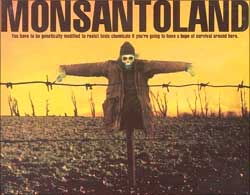 | « Back to article | Print this article |
 For a country that doesn't take much interest in scientists, Gilles-Eric Seralini can probably be termed well-known in India. Seralini is professor of molecular biology at the University of Caen in France, and he hit the headlines here early in 2009 when his analysis of the research data on the country's first transgenic vegetable, the Bt brinjal, was presented to the Supreme Court. He said the tests conducted by Mahyco, the company producing the Bt brinjal, were simply not valid and raised serious health concerns.
For a country that doesn't take much interest in scientists, Gilles-Eric Seralini can probably be termed well-known in India. Seralini is professor of molecular biology at the University of Caen in France, and he hit the headlines here early in 2009 when his analysis of the research data on the country's first transgenic vegetable, the Bt brinjal, was presented to the Supreme Court. He said the tests conducted by Mahyco, the company producing the Bt brinjal, were simply not valid and raised serious health concerns.
He also flagged several issues which India's top scientists who sit as the apex regulators on the Genetic Engineering Approvals Committee had overlooked. There are compelling reasons why India cannot afford to ignore Seralini's findings.
He comes with impeccable academic and research credentials and has been a member of two commissions evaluating the environmental and health risks of Genetically Modified Organisms in Europe. Algeria-born Seralini, 49, is a genial man who speaks softly in halting English and has a sense of humour which can be as unexpected as it is deadly, says Latha Jishnu. Excerpts:
You head the Committee for Independent Research and Information on Genetic Engineering (CRIIGEN). Is its expertise and independence recognised globally?
We have undertaken studies for the EU, the directorate of agriculture of the European Commission, Quebec's ministry of environment, the governments of Tunisia, Egypt, the Carrefour Group; we did studies on transgenic salmon for the University of Montreal, the European Spatial Agency and Greenpeace among others.
What is the biggest problem with GMOs?
You may not be aware that 99.9 per cent of edible GMOs are designed to contain toxic pesticides whose effect on the human body and the environment are not known. At CRIIGEN, we believe there should be transparency on the development of GMOs.
This is the biggest problem. Everything is kept confidential by the biotech companies whose data governments accept without validation. We need many more tests on the environmental and health-safety aspects of GMOs and it should be assessed independently. We want science to be used for the benefit of people, not companies.
Are the tests on GMOs inadequate?
No government anywhere has asked a company to do more than 90-day tests on GMOs. It's unbelievable that such tests are considered adequate for food that is given to babies and old people. Most companies also keep their test data secret, especially blood analyses of animals fed on GMOs.
This is not science; we are still living in the Middle Ages. No tests have ever been conducted by companies of the pesticides associated with GMOs on human cells. The blood analyses are performed only on rats and are kept unbelievably confidential.
 I must congratulate India on making the Mahyco data on Bt brinjal public. (This came about as a result of the Supreme Court case and a campaign launched by Greenpeace India). I must also congratulate Mahyco for tests conducted on three mammals but it did the tests for only two doses against three mandated in the OECD protocol (India claims to be following this protocol).
I must congratulate India on making the Mahyco data on Bt brinjal public. (This came about as a result of the Supreme Court case and a campaign launched by Greenpeace India). I must also congratulate Mahyco for tests conducted on three mammals but it did the tests for only two doses against three mandated in the OECD protocol (India claims to be following this protocol).
What is the most dangerous finding from your analyses of the Mahyco data?
The dossiers submitted by Mahcyo raise serious concerns. They are not signed by the researchers who did the tests, which means these can be considered invalid. But most significant, Bt brinjal has been modified to produce an unknown chimeric insecticide toxin. In the toxicity tests on target and non-target insects, this chimeric toxin was not used. Instead, an improper Cry1Ac toxin was used because this control was easier. Also, Bt brinjal is resistant to antibiotics, at least the well-known kanamycin.
How serious a health risk is that?
Antibiotic resistance, you must be aware, is recognised as a major health problem because of the growing genetic resistance to antibiotics, both in the environment and humans. You simply should not consider commercialising a food item that is resistant to antibiotics. Besides, several biotechnology companies have already developed transgenic plants without this marker gene.
So why is Mahyco unable to do so with its Bt brinjal?
It is possible that Mahyco bought an old unused GMO technology from Monsanto (The US biotech giant is the parent company of Mahyco).
Are there other concerns with Bt brinjal?
Bt brinjal appears to contain 15 per cent less kcal per 100 gram. It also has a different alkaloid content and 16-17 mg per kg of Bt insecticide toxin that is poorly characterised for side-effects. Significantly, rats fed on the Bt brinjal had diarrhoea, suffered liver weight loss while other animals, too, showed significant biological changes.
Given all these risks why is it that the GEAC did not bring it to the attention of the government?
I think the GEAC has not gone through the data on Bt brinjal. I have received mails from the GEAC asking me, "Why do you call it chimeric toxin?" So I had to point out the page and paragraph where it was mentioned in the Mahcyo dossiers! They should scrutinise the data carefully, go through it table by table to discover what lies hidden in these figures, and not go by the conclusions of the company.
 What should India do?
What should India do?
It should seek absolute transparency on GMO testing. GEAC and Mahyco must respond to the concerns raised on the side effects of Bt brinjal and the results should be available for public scrutiny. Also, GEAC should compel Mahyco to compare Bt brinjal with the same variety of brinjal, and not any variety that the company finds appropriate as it has done so far.
This is not proper science because it masks the real effects of the Bt toxin. Most important, the regulators must insist on full transparency in the blood analyses of animals fed on Bt brinjal. The best way would be to set up an independent testing facility. This way India will become the symbol of not only good science but also the source of good food for the rest of the world.
Should GMOs be banned altogether?
GMOs should be tested like drugs. This means full life-cycle tests on rats and other mammals. That's the only way one can assess their safety for human consumption. As for the environment, remember that once it is out in the open, you cannot confine it. In India, it will be the end of your rich biodiversity.
I understand that there are 2,000 varieties of brinjals in this country. You risk contaminating all of these. Let me give you an example: A tiny quantity of sterile GM maize producing a vaccine for pigs in the US has contaminated 500,000 tons of soya.
Even Europe is under US pressure on GMOs...
In spite of that, GM crops account for only 0.05 per cent of the acreage in Europe (100,000 hectares in Spain), while it is 18 per cent of US agriculture which produces 96 per cent of the world's edible GMOs. The European approach is that we don't know enough about this technology so long-term assessments must be made of the environmental and health impact.
The EU also stands for transparency and counter expertise, meaning independent scientific tests. I believe that the world is headed for the biggest health crisis ever because of the lack of transparency. It will make the financial crisis seem like a blip.